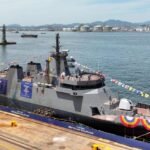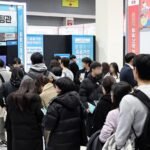
GYEONGJU, KOREA/WASHINGTON, D.C. – Kristalina Georgieva, managing director of the International Monetary Fund (IMF), has called on South Korea to overhaul its rigid labor market to adapt to sweeping changes driven by artificial intelligence, warning that as much as 60% of jobs in advanced economies could soon be affected.
“Artificial Intelligence is already transforming the way we work, the way we live, the way we communicate with each other,” Georgieva told The Korea Economic Daily in an exclusive interview in Gyeongju on Nov. 1 on the sidelines of the APEC Summit. “In advanced economies, 60% of jobs over the next years will be touched by artificial intelligence … this is like a tsunami hitting the labor market.”
Despite her warnings, the IMF chief offered an upbeat assessment of Korea’s fiscal and innovation record. She also praised Korea’s technological dynamism across diverse industries.

Georgieva is the first and only IMF managing director from Eastern Europe in the institution’s 80-year history.
She assumed the role in 2019 and has led the IMF since, overseeing more than $360 billion in emergency support for 97 countries during the COVID-19 pandemic. Reappointed last year, her term runs until 2029. She is also the IMF’s second female managing director ever.
A Bulgarian economist, Georgieva began her career at the World Bank in the 1990s. In 2017, she became the World Bank’s chief executive officer, the institution’s No. 2 position, overseeing global financial policy.

The following is an edited transcript of the interview with Georgieva.
▶How was your stay in Korea?
Excellent. Very impressed by the summit itself, by the, of course, K-pop, K-tech, K-everything.
▶What are the takeaways from the ASEAN and APEC summits?
The notion that the pathway for better opportunities for people around the world, at a more uncertain and difficult time for the world economy, is the cooperation of nations.
▶Can you elaborate?
First, how much open economies value trade as an engine of growth and the recognition that we have to seek ways in which this engine, even in a multipolar world, continues to deliver.
Second, countries in the APEC region, economies have been quite serious over the last decades to build strong macroeconomic fundamentals. The crisis that we have experienced led to the value of sound monetary policy, sound fiscal policy, and that foundation, at times of greater complexity, the world economy is clearly valued.
Third, cooperation (in) finding pathways to work together, to resolve differences.
▶You said the world is uncertain. How would you describe it in one word?
The word I would use is “transformation.” We are in a world in which multiple major forces of transformation are changing the way we interact with each other, we have politics, we have technology, we have demography, we have climate. All these forces are acting at the same time. They are creating more uncertainty and they are creating more pressure for countries to adapt.
▶Free trade seems to be in retreat. Can we return to an era of open trade?
When you look at the data on trade, it tells us that, still, 72% of trade is being done under Most Favored Nation rules. Second, it tells us that when we had a major shift in trade policy in the largest economy, the majority of the world chose not to retaliate, so we did not shift into a tit-for-tat downward spiral. Trade is like water. You put an obstacle. It goes around It. More than a thousand years of history tell us you can change the direction of the water, but you cannot stop its flow.
▶The US and China have agreed to a truce in their trade war.
It is very good for the world economy when the two largest economies find a pathway to resolve differences. We haven’t yet evaluated more in details what is in the impact of the agreement that has been reached, but very clearly, it is positive, and it is a year not only when there would be more trade between these two large economies, but it is also a year when talks can continue, and talking with each other is always the best way to resolve differences.
▶Will the US-China conflict be resolved smoothly?
I do expect that rational policy-making would dominate. It always does. And what is in the interest of people in both countries is to have vibrant economies that grow and offer opportunities to businesses and households, and in that sense, I’m optimistic that while differences are inevitable, there is a path to resolve them.
▶What do you see as the biggest risk to the global economy?
What we have experienced over the last couple of years, since 2020, is very telling. We are in a world of more frequent and severe shocks, and what I expect is that there would be surprises that come from both the decisions of policymakers, by decisions of the business community, and by Mother Nature. We just saw hurricane Melissa in the Caribbean, wiping out the economy of Jamaica.
▶How should the world respond?
Build strong buffers for shocks to come. Think about the unthinkable and get the economy ready to protect people and protect businesses when the unthinkable happens.
▶The IMF warned that average global public debt could reach 123% of GDP by 2029.
Global sovereign debt has gone up significantly. It was driven by the shocks I just talked about, by COVID, by Russia’s war in Ukraine, by price increases, by interest rates. We recommend gradual fiscal consolidation. Why do we ask for it? Because you have to be able to buffer yourself for the next shock to come, and also because servicing government debt takes away precious resources from investing in people, investing in the economy.
▶The IMF projects that Korea’s debt-to-GDP ratio will rise from 53% this year to about 63% by 2029. Is that worrying?
In contrast to the very high level of debt globally, Korea is in a very good position.
In Korea, government spending is used to provide more fairness in society, to help more vulnerable parts of society adapt to pressures coming in this uncertain world, but very importantly, it is used to invest in what is called here “ultra innovation economy.” Korea can be proud of its achievements in innovation. What I have seen in this short period of time is very impressive. Innovation is everywhere. Innovation is in shipbuilding, it is in agriculture, it is in urban living. It is even in cosmetics. And that puts Korea in a better position in a world in which technological transformation is very rapid, so you are ahead of the rest of the world.
▶How do you view Korea’s recent cash handouts to stimulate the economy?
Korea has gone through a political turbulence that has held growth back. When you’re faced with an exogenous shock to the performance of the economy, it is wise if you have fiscal space to use it, and this is what Korea is doing.
We are also encouraging countries to work on identifying ways to better target the use of public money. And that means, not only better targeting so the poorer part of societies to benefit, but also to come up with incentives for the wealthier part, rather than just keep the money in passive savings to invest more actively to generate more growth.
▶Many experts argue that structural reform is urgent for Korea, given low birth rates, an ageing population and declining potential growth.
We had a very good meeting with President Lee Jae Myung yesterday, and one of the points I brought to his attention, as what we at the IMF see as being very positive for Korea’s potential growth, was exactly structural reforms. Pursue them relentlessly, because if you don’t, with this rapidly changing world, you risk missing an opportunity for people.
▶Some say Korea is “NATO,” meaning No Action, Talk Only.
Do it in a way that is inclusive, that brings ownership of the whole society of these reforms. We did a study at the IMF, and it shows that when people are engaged, when there is genuine consultation on reforms and clear communication, then there is a higher acceptance.
▶There are growing concerns that AI may be a bubble.
Artificial Intelligence is already transforming the way we work, the way we live, and the way we communicate with each other. Companies that are on the leading edge are profitable because they are able to sell products they create.
Where there are risks, they’re twofold. First, the spread of artificial intelligence across the economy. The penetration in other sectors may be faster or slower. We just don’t know if it is slower, then that could create disappointment and fear that maybe it is a bubble. There is psychology that leads to people acting on a groupthink basis. Now they’re investing, and if there is concern, there could be a withdrawal, and that we have identified as a financial stability risk, we just have to be very watchful.
The second risk is how artificial intelligence is going to impact labor markets. We have done an assessment at the Fund, and it shows that in advanced economies, 60% of jobs over the next years will be touched by artificial intelligence, made more productive, sometimes significantly more productive, changed in the way they are being carried out, or eliminated. 60%, this is like a tsunami hitting the labor market.
▶How should countries respond?
We urge our members to think thoroughly through the kinds of policies that they need to have in place, both to take advantage of the opportunities of artificial intelligence, but also to manage to mitigate risks. We have created a ranking on AI preparedness, and we look at four things: digital infrastructure; labor market flexibility, adaptability; how innovation flows through the economy; and last, regulation and ethics.
When we rank countries on these four criteria, what we see is that, by and large, advanced economies are up, some emerging markets are well, but the developing world is way behind. So, we face a risk of divergence within countries. Some parts of society benefit much more than others, and we see a risk of divergence across countries.
By the way, Korea is No. 15 in our index.
▶How can Korea move up that ranking?
Labor market reform is one of the reforms Korea should pursue. You need to allow for not only skills to be agile and transferable, but also to have the ease of moving from one area of activity to another, and make sure that AI is contributing to inclusivity in society rather than pushing this divergence. In technological terms, Korea is way ahead.
It is the labor markets and it is regulation and ethics where attention has to be more focused.















